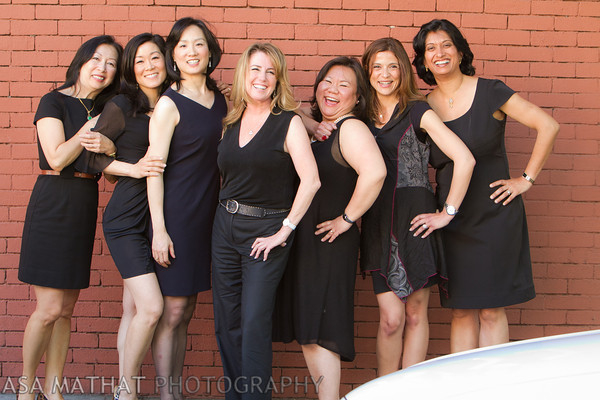by REBEKKAH MAR
For centuries, men and women have debated over roles and gender equality. They have disputed over societal and cultural traditions where men comprise the work force while women stay home and raise the children. Well, in the twenty-first century, change has been evident. Women are legislators, mayors, doctors, teachers, lawyers, and soldiers. The main difference is that women now have their own role models. Throughout the nation, successful career driven women, who are wives and mothers, have been speaking up and sharing their compelling stories. This wave of female confidence has been prevalent especially since the debut of Sheryl Sandberg’s novel, “Lean In.” One particular group who has gained national as well as global recognition is “ChIPs.”
“ChIPs” is an organization that focuses on the advancement of women in the IP industry. In 2005, seven highly experienced patent and IP lawyers of California’s Silicon Valley bonded over the minor role women play in legal affairs. The co-founders of “ChIPs” include Anirma Gupta, VP and Deputy General Counsel for Intuit Inc., Noreen Krall, Chief Litigation Counsel for Apple Inc., Michelle Lee, Director of the Silicon Valley of the United States Patent Trademark Office, Julie Mar-Spinola, VP Legal at Alta Devices, Inc., Mona Sabet, founder of software company Viblio, Emily Ward, VP and Deputy General Counsel of Technology and Patents at eBay, and Mallun Yen, Executive Vice President of RPX Corporation. They realized that women in their field were not receiving the well-deserved amount of credit, attention, and career advancement. Their solution was to create an organization that could impart their experience and knowledge to help mentor other young women in this growing and competitive world of patent and IP lawyers. Since then, the organization has developed from a local group in California to an annual convention held in Washington, DC. “ChIPs” is not only hosting another convention in DC this October, but is featured in Pamela Ryckman’s (NY Times Journalist) book, “Stiletto Network,” and is also the main focus of an article showcased on law.com.
During the month of June, I had the pleasure of interviewing four of the co-founders, Julie Mar-Spinola, Emily Ward, Mona Sabet, and Michelle Lee. “We decided to use our influence to encourage our outside counsel to promote their women professionals…we wanted to be visible and lead by example. Here we [the ChIPsters] were at the top of our legal IP organization, with kids or other external responsibilities vying for our time. We each found different ways of managing our professional and personal lives and wanted to show others that while difficult, success can be managed in different ways with different solutions,” said Julie Mar- Spinola. From forums to discussions, these seven women teach best practices, mentor younger women, and share stories of their experiences of triumph and adversity hoping to impart beneficial information. Co-founder Emily Ward shared her own stories of overcoming challenges. “If I look at where I am in my career, I would not be the same person or be successful if I did not overcome or go through certain challenges. While the challenges felt really difficult at the time, they were really good for me. When mentoring, I try to listen and ask questions. The best thing to do as a friend and mentor is to listen, empathize, and try to understand. A lot of the mentoring and coaching that I do is giving people reassurance that whatever people are going through in this moment will not define their lives. We need people that really believe in us and help us to have the confidence that we can ride out a storm and move on. You learn from each situation and you move past it. You need people who really believe in you and can relate to you.”
The information discussed in the forums and meetings are not necessarily exclusive to women. “The concepts are applicable across industries, across jobs, across genders, across everything. However, in the same way as if you were a company, you cannot say that the entire world is your audience. You have to focus on your area of competence and differentiation. The women in this group, their competence and differentiation is in IP and they understand how it is to be a woman in a male dominated profession. We have a focus of advancing women in IP, but that’s not to say that concepts couldn’t be applied to anybody. When we have events, we invite men too. But the goal is to advance women,” expressed Mona Sabet.
Women and men differ in many aspects, psychologically and emotionally. In a typical work place, most men confidently interject their opinion. They tend to compliment themselves as they achieve success and tend to not admit their mistakes. On the other hand, society has perceived many women as timid and modest. Based on the stories told in the interviews, women frequently second-guess their power and position. “But there’s a good side to it,” mentioned Sabet. “That allows us to be empathetic, allows us to be vulnerable. It helps us make connections because we’re not afraid to say what we don’t know. Men with a stereotypical personality don’t necessarily do those things and it doesn’t allow them to make the same connection.”
With that, “ChIPs” makes it their mission to engage women in promoting themselves and making their voices heard. “I feel an obligation to give back to those working their way up, who are generally younger, because a lot of people in my career helped me out. I don’t think that qualifies me as an feminist even though I would like to see the number of women increase because when I started [in the patent profession] there were very few. Anything that I can do to help develop and bring the best talent to places where it’s needed helps our country, our economy, and is good for society. You want to develop everybody’s potential to the maximum,” said Michelle Lee, Google’s former Head of Patents and Patent Strategy and now current director of the Silicon Valley of the United States Patent and Trademark Office.
These seven women not only faced adversity in their careers, but prevailed. They have helped countless women through their guidance and advice while also inspiring younger generations. As previously mentioned, the advice that “ChIPs” offers is not only for women in the IP field, but can be applied to most career situations. If interested in learning more about this dynamic organization, please visit Chipslaw.org. Women have changed history and will inevitably continue to do so even in a male dominated work field. As Julie Mar-Spinola stated, “Women need to articulate that it should never be a gender factor…it should be a merit factor.”


 https://t.co/N0vpOR0ijYhttps://t.co/MqV0OODKdD— Public Health […]
https://t.co/N0vpOR0ijYhttps://t.co/MqV0OODKdD— Public Health […]









Follow Us!